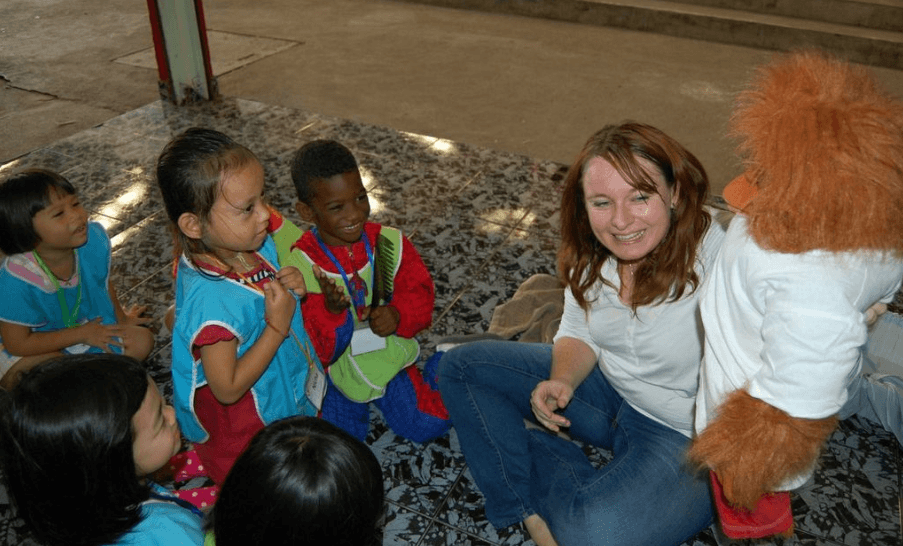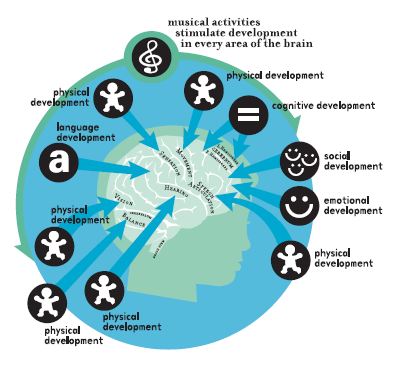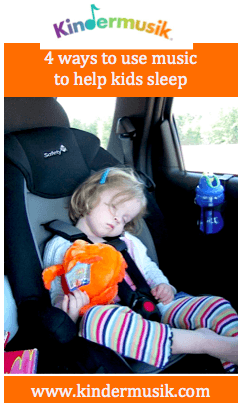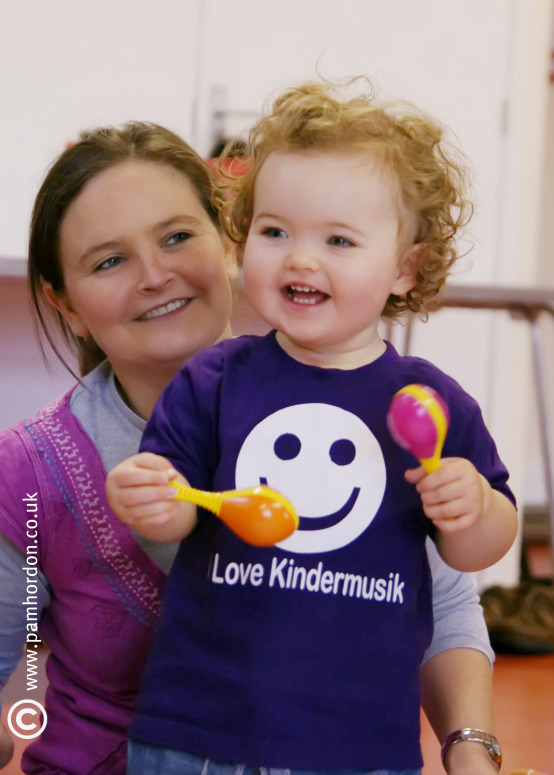Nothing really prepares you for parenting. It feels a bit like playing a game where the rules change constantly. For example, shortly after mastering the perfect origami-like swaddle, your child no longer needs it to sleep through the night. Or maybe you finally figured out how the straps on the stroller work but now your little one insists on crawling or walking everywhere. Sometimes, just when you think you got it figured out, it changes again. So how can baby music classes help?
Effective grownup and me classes should abide by one constant rule:
A parent is a child’s first and best teacher.
That might sound overwhelming, but here’s the thing: you shouldn’t have to navigate how to be the best teacher alone. In Kindermusik, we support parent and parent figures by introducing them to powerful music and movement strategies that help with everything from making tummy time successful to sleeping—and that goes waaaaaay beyond lullabies.
One study showed that babies who participate in interactive baby music classes with their parents smile more, communicate better, are easier to soothe, and show earlier and more sophisticated brain responses to music.
How is that possible? Let’s break it down.
4 Ways Baby Music Classes Support Development
1. Music supports the early stages of language development.
Does your baby sound like a pterodactyl? Totally normal. When we hear babies exploring the wide range of noises they can make with their mouths and tongues, they are actually engaging in play—vocal play to be specific. Cooing, babbling, blowing raspberries and, well, screeching like a pterodactyl are all part of it.
Vocal play is one of the early stages of language development and parents play a pivotal role. In class, a baby and caregiver engage in vocal play by touching, gazing, observing, listening, and imitating. All of this vocal play support’s a child’s vocal development by encouraging breath control, the use of the vocal cords, and the coordination of the small muscles in the face and mouth. Plus, the pausing and waiting during vocal play teaches a baby conversational turn-taking.
2. Music helps babies experience patterns.
During the first several months of life, babies follow a predictable pattern. Eat. Sleep. Diaper change. Eat. Sleep. Diaper change. Patterns help babies connect to and learn about the world. From recognizing the facial pattern of two eyes, a nose, and a mouth to responding to the daily routine pattern and eventually sleeping longer at night (really)!
Babies and young children who learn to identify patterns strengthen their sense of safety and even future academic success because they can better predict what happens next. Each week in class, babies experience patterns through rhythm and meter, tempo contrasts, dances, language and vocal play and the routine of the lesson flow.
3. Music and movement provide opportunities for fine- and gross-motor skills development.
Babies grow by leaps and bounds their first year—or more accurately by grasps and scoots. One minute, you hold a newborn who reflexively grasps your finger. The next minute, your baby intentionally reaches up to touch your nose. Whether reaching for a nose, lifting a head during tummy time, clapping, rolling over, sitting up, crawling, or walking, a baby spends tireless hours learning how to intentionally move.
Each week in class, we provide many opportunities for a baby to engage in fun, musical activities that support and strengthen each stage of a child’s movement development. From tummy time to playing with baby-safe instruments to gently bouncing a baby in a caregiver’s lap, class activities will support the development of the small and large muscles as well as coordination for more complex movements like eventually kicking a ball, jumping, and even writing.
4. Music helps babies gain active listening skills.
Do you ever just stop and really listen to your surroundings? It’s kind of noisy. You might hear the humming of the refrigerator, birds singing, cars driving by, wind blowing…
As an adult, you know how to tune in to the sounds that matter most. Babies do not. In fact, young babies hear most of it—including the more than 300 different phonemes, tones, and clicks used to express every single language in the world!
At Kindermusik, we know babies need to learn how to tune in to the sounds and language most needed in their daily lives. In fact, a baby can already distinguish the sound of a parent’s voice from everyone else’s voice. In class each week, we enhance a baby’s growing discriminatory listening skills when we listen to and imitate different animal noises, the various sounds of instruments, and the voices of adults singing and humming. This ability to detect and attend to sounds, and to distinguish between them, sets a baby on the path to fine-tuned listening and receptive language.
Baby music classes are for parents, too!
 Becoming a parent turns a person’s world (and social calendar) upside down and inside out. A person moves from lengthy conversations over dinner to brief chats scheduled around naptimes.
Becoming a parent turns a person’s world (and social calendar) upside down and inside out. A person moves from lengthy conversations over dinner to brief chats scheduled around naptimes.
A grownup-and-me class should help children develop social and emotional skills, but we also connect grownups with other parents and caregivers who understand the unique joys and challenges of raising a child. One of the most rewarding things educators witness is how the adults make lasting connections of their own.
Search for a Kindermusik class near you or check out our early learning kits to learn more about how to sing to babies in a way that supercharges development.
Contributed by Lisa Camino Rowell, a freelance writer living in the Atlanta area.


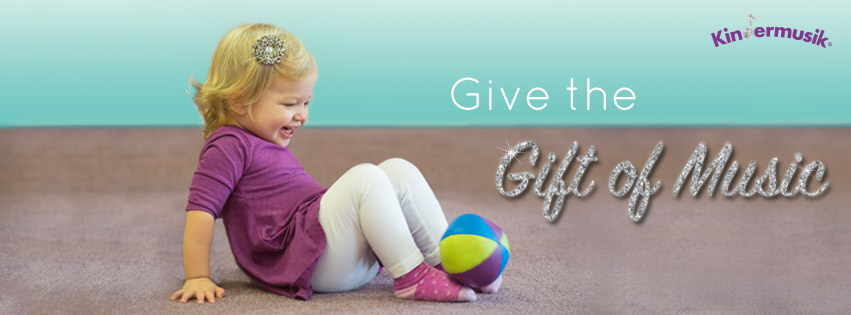

 Becoming a parent turns a person’s world (and social calendar) upside down and inside out. A person moves from lengthy conversations over dinner to brief chats scheduled around naptimes.
Becoming a parent turns a person’s world (and social calendar) upside down and inside out. A person moves from lengthy conversations over dinner to brief chats scheduled around naptimes.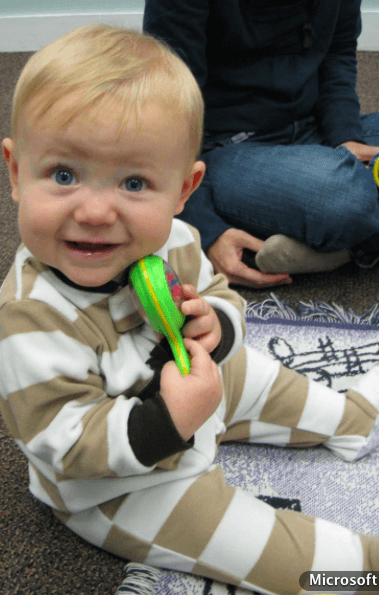



 With educators in over 70 countries, you can imagine we speak a lot of languages when we get together! Thankfully, we do share one common language: music and learning. A group of VYL ELL teachers in Italy recently experienced this common language at a one-day training session hosted by Kindermusik.
With educators in over 70 countries, you can imagine we speak a lot of languages when we get together! Thankfully, we do share one common language: music and learning. A group of VYL ELL teachers in Italy recently experienced this common language at a one-day training session hosted by Kindermusik. “I’ve really enjoyed this ABC English & Me Training day. It was very informative and gave us many opportunities to try out this comprehensive and effective way of teaching. I was pleased to see that it is based on strong research and feel it is something that will surely help me develop, both professionally and personally. I am confident that this method of teaching will successfully bring a whole new way of language learning to this school that can only benefit our students.” ~ Kate Letts – Lingua Point
“I’ve really enjoyed this ABC English & Me Training day. It was very informative and gave us many opportunities to try out this comprehensive and effective way of teaching. I was pleased to see that it is based on strong research and feel it is something that will surely help me develop, both professionally and personally. I am confident that this method of teaching will successfully bring a whole new way of language learning to this school that can only benefit our students.” ~ Kate Letts – Lingua Point “This training was very useful. In reality, putting the method into practice is much simpler than it seems with the help of the Kindermusik site and digital teachers guides. I have no doubt that the children will find the lesson activities engaging and fun. On the other hand, the teachers can find all the support necessary on the website and through the music provided.” ~ Sara Verducci – The Victoria Company
“This training was very useful. In reality, putting the method into practice is much simpler than it seems with the help of the Kindermusik site and digital teachers guides. I have no doubt that the children will find the lesson activities engaging and fun. On the other hand, the teachers can find all the support necessary on the website and through the music provided.” ~ Sara Verducci – The Victoria Company


